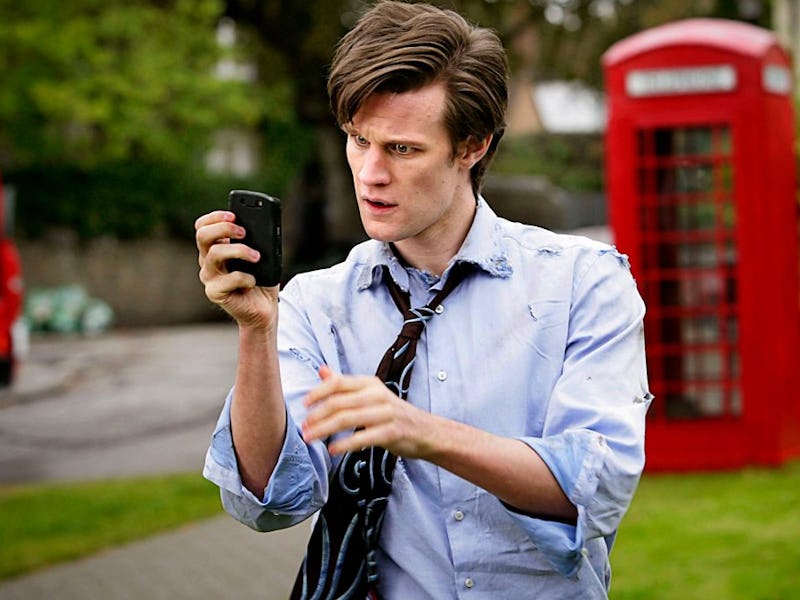Doctor Who’s Second — and Best — Reboot Turned It Into a Global Phenomenon
“The Eleventh Hour” is a perfect soft launch for the show’s most successful era.

There’s a moment during David Tennant’s live announcement of his exit from Doctor Who, made via satellite video at Britain’s National Television Awards, when you can hear a woman scream “No!” over the sounds of shock and disbelief from the audience. That nameless woman unintentionally became the voice of countless fans devastated by the departure of the beloved actor, whose time on Doctor Who had turned him into a geek icon. But change is built into the DNA of Doctor Who, and it was inevitable that Tennant, like the nine actors before him, would leave the show. But at the risk of sounding dramatic, the stakes for this change were never higher.
In 2010, when Tennant left the series, Doctor Who had only been back on the air for six years. The original series had died an ignominious death in the ’80s, reduced from a sci-fi staple to a punchline. The 2005 revival had its work cut out for it in making Doctor Who cool again, and with the dashing Tennant in the lead, it was on the cusp of doing so. It was in this charged environment that a then-unknown Matt Smith would be cast to replace him. With circumstances stacked against Smith and every fan prepared to hate him, he managed to deliver the best soft reboot of Doctor Who ever.
Matt Smith debuted as the 11th Doctor in the aptly titled Season 5 opener, “The Eleventh Hour,” a breezy caper that sets the stage for his whimsical, fairytale-inspired era of the show. In the brisk 65-minute episode, the newly regenerated Doctor crash-lands in the backyard of Amelia Pond (Caitlin Blackwood), a young Scottish girl terrified of the ominous crack in her wall. That’s understandable, because it turns out to be a crack in the skin of the universe, and on the other side is an alien prison that’s lost a prisoner (Olivia Colman).
Before the Doctor can further investigate, he’s called back to his malfunctioning TARDIS, leaving with the intention of returning immediately. Except he comes back 12 years later, and Amelia has become Amy Pond (Karen Gillan), a young woman shocked to find her imaginary friend has returned, and even more shocked to learn that the escaped alien prisoner has been hiding in her house this whole time. The still-regenerating Doctor must convince Amy to help him, or risk the Earth being destroyed by the prison guards who have finally located their lost captive.
The joy of “The Eleventh Hour” is that it’s simultaneously high-energy and effortless, zipping through its world-saving plot with all the breathlessness of Smith’s own mile-a-minute dialogue. On its own, it’s a funny, witty, and stylish hour of television that gives as much time to Smith’s hilarious pratfalls as it does the sweet Peter Pan and Wendy dynamic of the Doctor and Amy. But in the wider context of Doctor Who, it’s miraculous.
“The Eleventh Hour” was the start of Doctor Who’s biggest changeover since the revival began. Russell T. Davies, who shepherded the 2005 revival, was leaving. Steven Moffat was taking over as showrunner, bringing an entirely new crew with him. Despite some loose references to past events, Doctor Who was, for all intents and purposes, an entirely new show. It was a radical move for a show with a fandom still grieving the departure of Tennant. But “The Eleventh Hour” managed to not only soothe fans’ fears about Smith as the Doctor, but kick off the show’s most successful era — a success the series has never been able to recapture.
The Doctor and Amy Pond, in the first of their many great adventures.
From Smith’s first scenes, it’s clear he’s a radical departure from Tennant’s swashbuckling Doctor. He was silly, he was childish, and his limbs seemed too long and gangly for him to control. By the time he pops his head out of the TARDIS and requests that Amelia Pond feed him an apple, he had sold his distinct version of the Doctor as a weirdo whose mind moved faster than his mouth.
It was this Doctor whose face would be gracing New York buses, and whose era was the most popular stateside thanks to BBC America’s push for simultaneous British and American premieres. The 11th Doctor took the character’s geek icon status global — Smith, Gillan, co-star Arthur Darvill, and Moffat would become Comic-Con staples — and for a time, Doctor Who was the most popular sci-fi show on the planet. Looking back, it’s strange that this decidedly uncool version of the Doctor would be the face of Doctor Who at its most globally popular, but that’s just the power of Smith’s charms.
Nostalgia might paint Tennant’s era as the best, but there’s no question that “The Eleventh Hour” was the start of Doctor Who’s most successful era. It would decline fast with its ambitious but confused sixth season, leading it to fall out of the zeitgeist just as quickly. But it’s still incredible to think back on a time when Doctor Who ruled the world, and its king was a weird alien who kept running into trees.
This article was originally published on